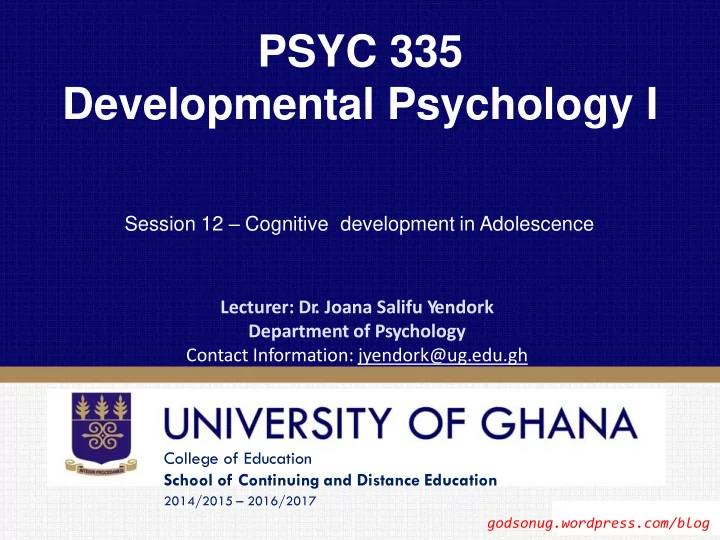

PSYC 335 Developmental Psychology I Session 12 – Cognitive development in Adolescence Lecturer: Dr . Joana Salifu Y endork Department of Psychology Contact Information: jyendork@ug.edu.gh College of Education School of Continuing and Distance Education 2014/2015 – 2016/2017 godsonug.wordpress.com/blog
Session Overview • The focus of this session is on the changes in the cognitive domain of development in the adolescence stage. Both the gains and limitation in the Formal Operational Stage of Piaget ’ s theory of Đ ogŶi ti ǀ e de ǀ el opŵeŶ t ǁ i ll ďe dis Đ ussed. Slide 2
Session Outline The key topics to be covered in the session are as follows: • Cognitive changes in adolescence • Consequences of abstract thoughts • Sex differences in mental abilities Slide 3
Reading List • Read Chapter 11 of Development through the lifespan, Berk (2006) Slide 4
T opic One COGNITIVE CHANGES IN ADOLESCENCE Slide 5
Cognitive changes in adolescence • Formal Operational Stage (age 11+): this is the stage where adolescents develop the ability to think abstractly. • The adolescent can operate on operation and do not require concrete things and events for logical thought. • They are able come up with new , more logical rules through internal reflection – More abstract than concrete operational thought – Increased verbal problem-solving ability – Increased tendency to think about thought itself • Understanding knowledge (how/when gained) • MoŶi tori Ŷg oŶe’ s o ǁ Ŷ ŵeŶ tal states Slide 6
Cognitive changes in adolescence – Thoughts of idealism and possibilities • ͞ If-the Ŷ͟ thi Ŷ ki Ŷg • Connection between how things are and how they might have been or could be . – More logical thought • Hypothetico-deductive reasoning : involves creating a hypothesis and deducing its implications • Propositional thought : the ability to evaluate the logic of propositions (verbal statements) without referring to real-world circumstances. Slide 7
Piaget ’ s Pendulum Problem Slide 8
T opic Two CONSEQUENCES OF ABSTRACT THOUGHT Slide 9
Consequences of abstract thought Self-Consciousness and Self-focusing • Cognitive changes lead to revision in how adolescents view themselves, others and the world • This leads to improved reflection on thoughts, physical and psychological changes lead to heightened self- consciousness and self-focusing – Adolescents also tend to think more about themselves Slide 10
Consequences of abstract thought • Adolescent egocentrism: difficulty distinguishing their perspectives from others. Shown by 2 cognitive distortions • Imaginary Audience: adolescents ’ belief that they are the f oĐus of e ǀ ery oŶe else ’ s atte Ŷ ti oŶ a Ŷd Đ oŶĐerŶ – Extremely self-conscious – Avoidance of embarrassment • Explains hours spent on appearance • Explains sensitivity to public criticisms Slide 11
Consequences of abstract thought • Personal Fable: involves a sense of uniqueness and invincibility – Invincibility attitudes are associated with reckless behavior • Drug use • Suicide • Having unprotected sex • Imaginary audience and personal fables are strongest during early adolescence followed by a gradual decline • Critiques hold that the distortions are not due to egocentrism but gains in perspective taking Slide 12
Consequences of abstract thought Idealism and Criticism • Because adolescents can think about possibilities, they can imagine an ideal world and think about alternative systems of political, religious, family , and moral organization • Disparities between the worldview of adolescents and adults, increase tension between teenagers and parents – positive resolution of the conflict between the possible and the actual can lead to increases in volunteer behaviour , involvement in community, small and large efforts to make the world better – negative resolution of this conflict can lead to destructive rebelliousness, increased social isolation, unhappiness Slide 13
Consequences of abstract thought Decision making • Adolescents often do not follow the steps of rational thinking in their decision making: – 1)identifying alternatives; – 2)identifying the pros and cons of each alternative; – 3)assessing the likelihood of various outcomes; – 4)choosing the alternative that has the best chance of achieving their goals; – 5)evaluating the outcome in terms of whether their goals were met; – 6)learning from their mistakes Slide 14
Consequences of abstract thought • They fall on intuition • Adolescents may find decision making difficult because – They do not have sufficient knowledge to predict potential outcomes – Overwhelmed by choices – More likely to choose short-term positive goals over long-term positive goals Slide 15
T opic Three SEX DIFFERENCES IN MENT AL ABILITIES Slide 16
Sex Differences in Mental Abilities Skill Performance Biological Influences Environmental Influences Parents talk more to Verbal Girls do better from Girls: advantage in left early ages, hemisphere of brain girls throughout school Language arts considered 䇾 feminine 䇿 Boys better at Mathematics Math Boys: better numerical considered 䇾 abstract reasoning memory, spatial masculine. 䇿 Gap larger at reasoning Parents see boys as higher levels, although shrinking better at math
Sample Question • In what ways are the thinking of adolescents different from that of children in the early childhood stage of human development?. Slide 18
Recommend
More recommend